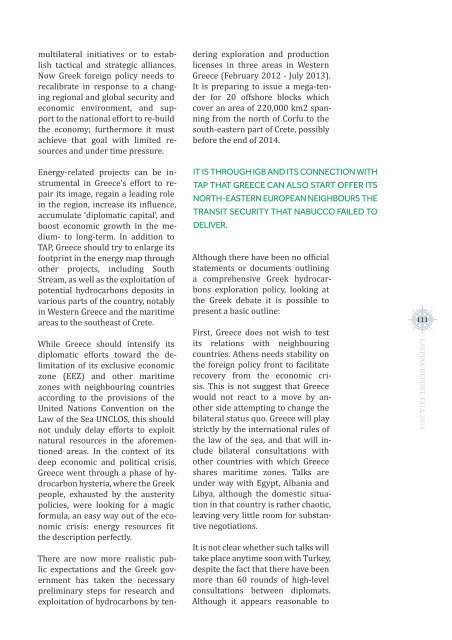Create successful ePaper yourself
Turn your PDF publications into a flip-book with our unique Google optimized e-Paper software.
multilateral initiatives or to establish<br />
tactical and strategic alliances.<br />
Now Greek foreign policy needs to<br />
recalibrate in response to a changing<br />
regional and global security and<br />
economic environment, and support<br />
to the national effort to re-build<br />
the economy; furthermore it must<br />
achieve that goal with limited resources<br />
and under time pressure.<br />
Energy-related projects can be instrumental<br />
in Greece’s effort to repair<br />
its image, regain a leading role<br />
in the region, increase its influence,<br />
accumulate ‘diplomatic capital’, and<br />
boost economic growth in the medium-<br />
to long-term. In addition to<br />
TAP, Greece should try to enlarge its<br />
footprint in the energy map through<br />
other projects, including South<br />
Stream, as well as the exploitation of<br />
potential hydrocarbons deposits in<br />
various parts of the country, notably<br />
in Western Greece and the maritime<br />
areas to the southeast of Crete.<br />
While Greece should intensify its<br />
diplomatic efforts toward the delimitation<br />
of its exclusive economic<br />
zone (EEZ) and other maritime<br />
zones with neighbouring countries<br />
according to the provisions of the<br />
United Nations Convention on the<br />
Law of the Sea UNCLOS, this should<br />
not unduly delay efforts to exploit<br />
natural resources in the aforementioned<br />
areas. In the context of its<br />
deep economic and political crisis,<br />
Greece went through a phase of hydrocarbon<br />
hysteria, where the Greek<br />
people, exhausted by the austerity<br />
policies, were looking for a magic<br />
formula, an easy way out of the economic<br />
crisis: energy resources fit<br />
the description perfectly.<br />
There are now more realistic public<br />
expectations and the Greek government<br />
has taken the necessary<br />
preliminary steps for research and<br />
exploitation of hydrocarbons by tendering<br />
exploration and production<br />
licenses in three areas in Western<br />
Greece (February 2012 - July 2013).<br />
It is preparing to issue a mega-tender<br />
for 20 offshore blocks which<br />
cover an area of 220,000 km2 spanning<br />
from the north of Corfu to the<br />
south-eastern part of Crete, possibly<br />
before the end of <strong>2014</strong>.<br />
IT IS THROUGH IGB AND ITS CONNECTION WITH<br />
TAP THAT GREECE CAN ALSO START OFFER ITS<br />
NORTH-EASTERN EUROPEAN NEIGHBOURS THE<br />
TRANSIT SECURITY THAT NABUCCO FAILED TO<br />
DELIVER.<br />
Although there have been no official<br />
statements or documents outlining<br />
a comprehensive Greek hydrocarbons<br />
exploration policy, looking at<br />
the Greek debate it is possible to<br />
present a basic outline:<br />
First, Greece does not wish to test<br />
its relations with neighbouring<br />
countries. Athens needs stability on<br />
the foreign policy front to facilitate<br />
recovery from the economic crisis.<br />
This is not suggest that Greece<br />
would not react to a move by another<br />
side attempting to change the<br />
bilateral status quo. Greece will play<br />
strictly by the international rules of<br />
the law of the sea, and that will include<br />
bilateral consultations with<br />
other countries with which Greece<br />
shares maritime zones. Talks are<br />
under way with Egypt, Albania and<br />
Libya, although the domestic situation<br />
in that country is rather chaotic,<br />
leaving very little room for substantive<br />
negotiations.<br />
It is not clear whether such talks will<br />
take place anytime soon with Turkey,<br />
despite the fact that there have been<br />
more than 60 rounds of high-level<br />
consultations between diplomats.<br />
Although it appears reasonable to<br />
111<br />
CASPIAN REPORT, FALL <strong>2014</strong>










